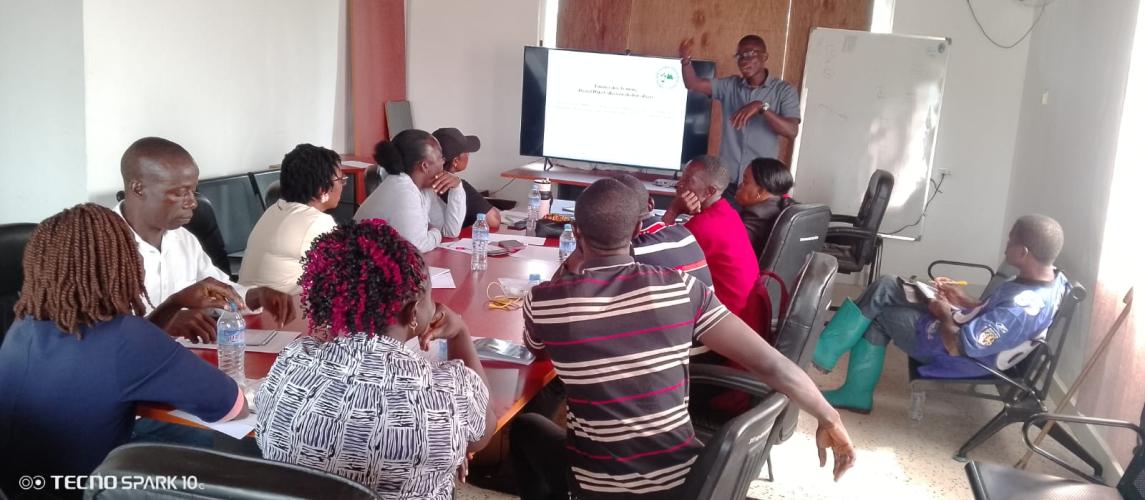
CARI Socioeconomics Program Launches First Client Satisfaction Survey in Bong County to Strengthen Service Delivery and Feedback Systems
SUAKOKO, Bong County – The Department of Socioeconomics and Applied Statistics at the Central Agricultural Research Institute (CARI) has officially launched its first-ever client satisfaction survey in Bong County. This groundbreaking initiative is designed to enhance service delivery, establish effective feedback mechanisms, and strengthen the institute’s engagement with farmers and stakeholders.
Located approximately 120 kilometers (75 miles) northeast of Monrovia, CARI is Liberia’s premier agricultural research hub. Established in 1948 as the Central Agriculture Experiment Station (CAES), reorganized in 1980 as the Central Agricultural Research Institute (CARI), the institute, which operated as a semi-autonomous agency under the Ministry of Agriculture, is now autonomous. Its mandate includes conducting agricultural research, developing improved crop varieties, supporting national food security initiatives, and promoting sustainable farming practices
Strategically positioned in Bong County, CARI serves both rural and urban farming communities, making it a vital institution for Liberia’s agricultural transformation.
Launched at the Science Building on November 18, 2025, the client satisfaction survey seeks to collect accurate and reliable data from farmers and stakeholders, evaluate CARI’s services and technologies, identify gaps and opportunities for improvement, and strengthen accountability and transparency in agricultural research delivery. This pilot survey will cover all seven districts in Bong County, ensuring broad representation and inclusivity.
Speaking on behalf of the Director General, Dr. James S. Dolo, Head of the Crop Program, commended the Socioeconomics and Applied Statistics team for spearheading this initiative. “Since 2007, when I joined CARI, this is the first time the institute has undertaken such an exercise to gather direct feedback from clients and farmers. This is a sensitive but necessary step to evaluate ourselves and recalibrate our services,” Dr. Dolo remarked.
He urged participants to remain focused and emphasized the importance of credible data collection, cautioning research assistants against manipulating results. Reliable data, he stressed, is essential for revisiting and realigning policies and programs.
Bendu T. Tonkollie, Head of the Socioeconomics and Applied Statistics Department, outlined the objectives of the digital data collection process. She explained that data collection is critical for supporting evidence-based decision-making, testing hypotheses, identifying problems and opportunities, generating new knowledge, and measuring and monitoring change.
She emphasized that data-driven conclusions ensure that CARI’s interventions are grounded in evidence rather than assumptions.
Eric E. Pluato, Socioeconomist, introduced the KoboCollect tool, a digital platform that will be used by enumerators to gather field data efficiently. The Statistician explained that the tool will help map feedback mechanisms and improve service delivery across Bong County.
Representing the Ministry of Agriculture and the County Agriculture Office, Momue G. Kollie, Kokoya District Agriculture Officer, praised CARI for organizing the enumerator training. “This survey is a timely initiative. It will benefit farmers, CARI, and the communities by ensuring that services are aligned with real needs. I hope the exercise will be successful and impactful,” Kollie stated.
The launch of CARI’s first client satisfaction survey marks a historic milestone in the institute’s journey toward accountability, transparency, and improved service delivery. By leveraging digital tools and engaging directly with farmers, CARI is setting a new standard for agricultural research in Liberia.
The Socioeconomics and Applied Statistics Program at the Central Agricultural Research Institute (CARI) in Liberia is an interdisciplinary unit that analyzes the relationship between agriculture, economic activity, and social factors, while applying statistical methods to guide evidence-based decision-making.
The Department plays a crucial role in agricultural research and development. It examines how economic processes affect social issues such as wealth distribution, inequality, and the impact of government policies on living standards. By integrating economics, sociology, and statistics, the program ensures that agricultural innovations are not only technically sound but also socially and economically viable.
This initiative not only strengthens CARI’s institutional capacity but also empowers farming communities by ensuring their voices are heard in shaping the future of Liberia’s applied and adaptive agricultural research.
